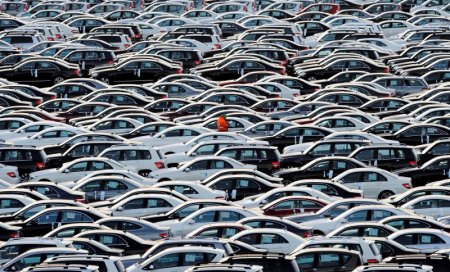 A worker walks along rolls of Mercedes cars at a shipping terminal in the harbor of the town of BremerhavenThomson Reuters
A worker walks along rolls of Mercedes cars at a shipping terminal in the harbor of the town of BremerhavenThomson Reuters
BERLIN (Reuters) – The German economy had a good start to the second quarter and its upswing is likely to continue albeit at a slower pace than in the first three months of the year, the Finance Ministry said on Monday.
Europe’s largest economy grew 0.7 percent between January and March, its strongest quarterly rate in two years, as soaring private consumption, higher construction investment and state spending on migrants more than offset weak foreign trade.
The government expects domestic demand to drive an overall economic expansion of 1.7 percent in 2016, on a par with last year.
“The German economy had a good start to the second quarter,” the ministry said in its monthly report. “Economic indicators overall suggest a continuation of the economic upswing, albeit at a less dynamic pace than at the beginning of the year.”
Rising employment, higher wages and low interest rates are boosting the purchasing power of German consumers, the ministry said, adding: “Altogether, the conditions for private consumption remain good.”
The resulting strong domestic demand is pushing up the state’s tax income, with overall revenues up nearly 6 pct on the year in first five months of 2016, the finance ministry said.
Buoyant tax revenues were enabling Finance Minister Wolfgang Schaeuble to increase state spending on migrants and infrastructure while keeping a balanced budget.
Turning to foreign trade, the ministry said exports were still growing thanks to strong demand from European Union countries which was cushioning the effect of weaker demand from emerging markets such as China, Brasil and Russia.
“Nevertheless, trade-related risks remain, especially with regard to the still sluggish development of the world economy,” it added.
(Reporting by Michael Nienaber,; Editing by Richard Balmforth)
Read the original article on Reuters. Copyright 2016. Follow Reuters on Twitter.
More from Reuters:
- Toyota to build artificial intelligence-based driving systems in five years
- Roche announces availability of LightMix modular Zika Virus Assay
- California power grid prepares for heatwave, possible natgas shortage
- Incoming Philippine minister seeks emergency powers to fix traffic snarl
- New Zealand extends deployment of troops training Iraqi army















